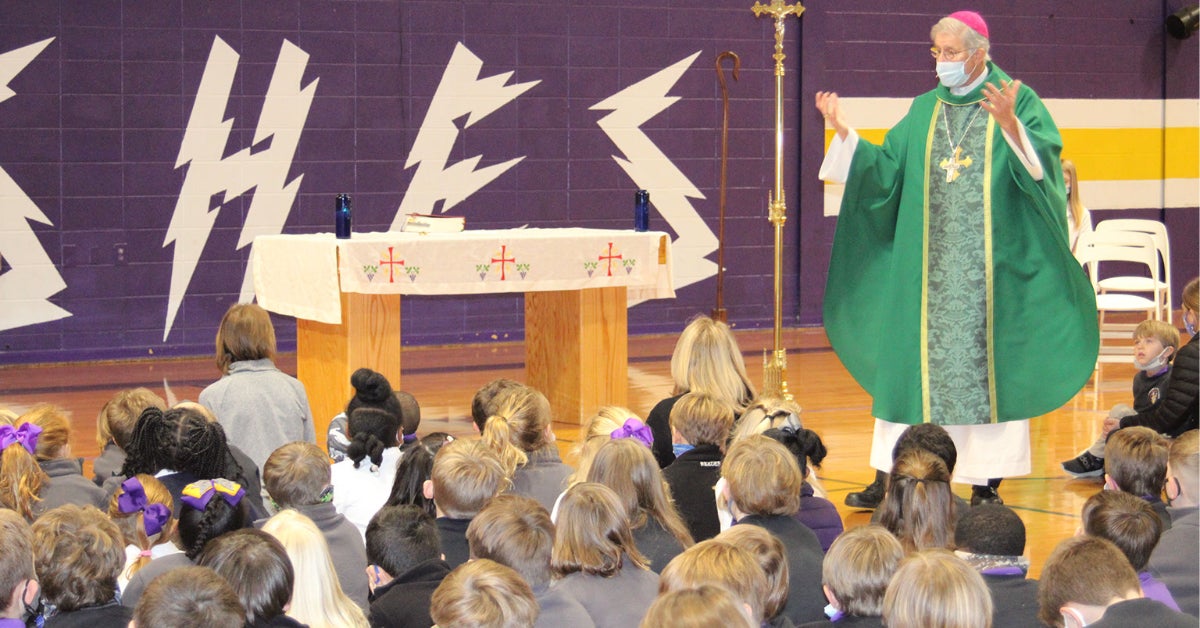Bishop: Omicron won’t force Catholic Diocese of Jackson to go back to pandemic precautions
Published 4:00 am Sunday, February 6, 2022

- Joseph Kopacz, Bishop of the Diocese of Jackson, talks to students during a Thursday morning Mass for Catholic Schools Week at Vicksburg Catholic Schools Week. (Photo by John Surratt | The Vicksburg Post)
Bishop Joseph Kopacz, bishop of the Catholic Diocese of Jackson, said the parishes and schools in the diocese will continue taking precautions with the increase in the spread of the Omicron variant of COVID-19, but not to the extent the diocese did during the 2020 pandemic.
“For a while, we were live-streaming; virtual,” he said.
In the early months of the pandemic, Catholics, like members of other faiths, stayed home and watched Mass through their church’s website or Facebook page. Parishioners were later allowed to return for Mass in-person, but under guidelines that included mandatory masks and social distancing of at least 6 feet.
In April 2021, a directive from the diocese still required masks, but reduced social distancing during mass from 6 feet to 3 feet and allowed the return of hymnals and missalettes to church pews. In September, a directive from the diocese recommended but did not require that masks be worn and kept social distancing at 3 feet.
“I believe two years later we have learned a lot,” Kopacz said. “We’re certainly attuned to what public health officials are saying, plus vaccinations, plus the use of masks appropriately. We can end this; we’re not going back, we’re going forward and hopefully, this virus goes back as we go forward.”
Kopacz’s comments came after he said Mass Thursday at Vicksburg Catholic School as part of the school’s Catholic Schools Week program.
“You have a great tradition at Vicksburg Catholic School and it goes back a long way,” the bishop told students, pointing out that Catholic education in Warren County goes back to 1860. “That’s when the sisters came and then 20 years later the brothers came, and then St. Mary’s had their own school. And as time went on, it comes together to what we know as Vicksburg Catholic.”
He recalled Gov. Tate Reeves’ comments when he signed a proclamation for Catholic Schools Week.
Reeves, he said, “said something very special. He said in our schools we become faith-built disciples; we become enriched citizens and we become servants of Jesus. That’s a real special way to look at how we live together and act together in our schools.”
After Mass, Kopacz said Catholic education in Mississippi has had an influence on the state.
“I believe the Catholic school tradition has served a lot of students and families down through the generations, going back into the 19th century,” he said. “It was really, I believe, the first educational institution that served African-Americans, whoever came through the door, so there was that whole commitment.”
Education, he said, “Is the cornerstone, bringing in literacy, bringing in through that a sense of dignity and self-respect and people realized they could achieve. It’s taken a long time for the state even to recognize how important education is.”
He recalled a recent visit to a school where he met the grandparents of a student who received an education in Catholic school, left the state and then returned.
“They said, ‘We received our foundation here, we went off to college, but then after a certain period of time we came back to give back to the state,” Kopacz said. “That’s real, so I think the church through Catholic education has been a big influence for better in the state.”






